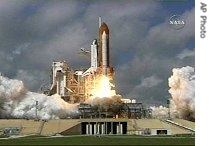2006年VOA标准英语-Space Shuttle Atlantis Finally Blasts Off for C(在线收听)
By Richard Green
Washington
09 September 2006
 The Space Shuttle Atlantis lifts off launch Pad 39B at the Kennedy Space Center in Cape Canaveral, Sept. 9, 2006 (NASA TV) |
||
-------
With just minutes left of the official countdown in the launch of the space shuttle Atlantis from the Kennedy Space Center (K.S.C) in Florida, flight controllers with the U.S. space agency NASA gave the seven-member crew the good news they had been waiting for.
"Atlantis, OTC, it's been a long road, with a lot of detours but your patience is about to be rewarded -- it's time to fly," said mission control.
Moments later, Atlantis blasted into the blue sky to the jubilation of spectators and NASA officials.
The crew will arrive at the International Space Station on Monday. It is carrying a new 17-ton segment for the orbital outpost that contains a new set of giant solar energy panels. Three crewmembers will conduct three crucial spacewalks to attach the new segment.
This mission was originally scheduled for 2003, but was put on hold after the space shuttle Columbia disaster that year. NASA is hoping to finish construction of the International Space Station before the space shuttle fleet is retired in 2010.
Bill Gerstenmaier, associate administrator for NASA, says the space shuttle program is heading into the most exciting and challenging phase of its 25-year history. "We got a lot of work to do, we got a lot of things to put in place...then we're going to work with our partners to get their modules up and do a lot of activities on board station. I don't look at it as this is approaching the end. This is probably one of the best times we've ever had to really be in a posture to learn and to jumpstart the next program that begins," he said.
Saturday's launch ended a string of postponements stretching back to late August. It was delayed twice because of bad weather, and twice due to technical problems.
The U.S. space shuttle Atlantis has reached orbit, after a successful launch following nearly two weeks of delays.
The shuttle was launched Saturday on a mission to the International Space Station. If weather or technical problems had prevented today's launch, the space agency, NASA, would have faced a delay of several weeks, because a Russian mission to the station is planned for later this month.
Astronauts on Atlantis plan to attach a new set of solar energy panels to the space station to help generate power. Those panels will reach 80 meters in length when fully unfurled.
Construction on the space station was halted after the shuttle Columbia disaster in February 2003 forced a long moratorium on shuttle flights. Columbia broke up on re-entry to the earth's atmosphere, killing all seven astronauts on board.